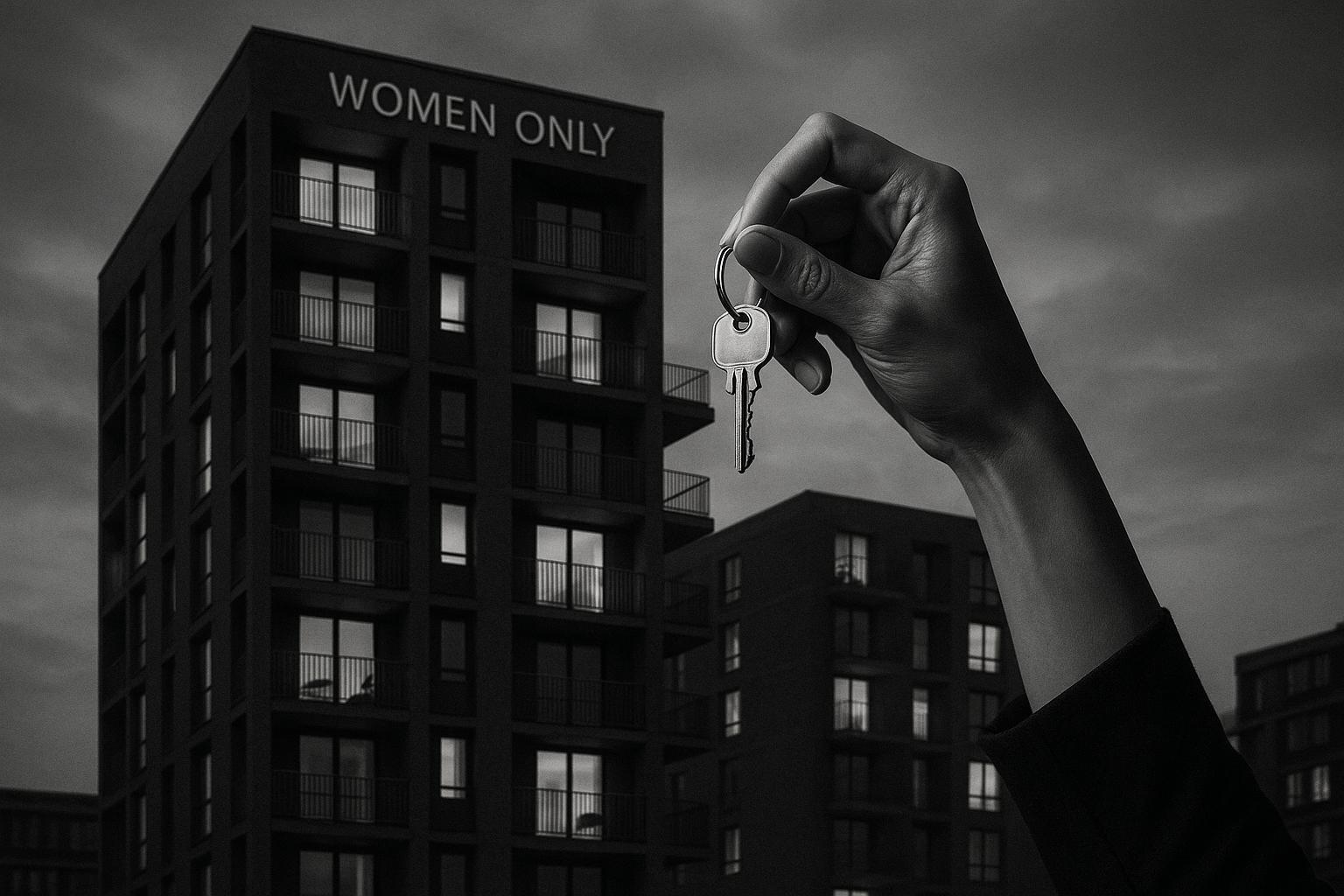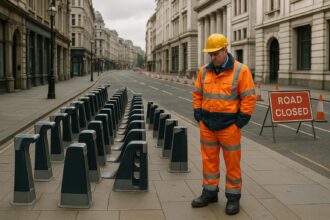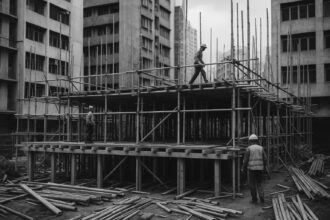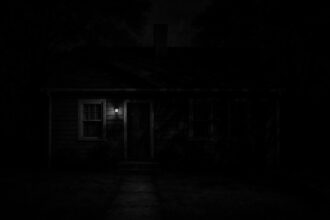A new residential tower in West London will offer 102 affordable flats exclusively to women, providing safe, specialist accommodation for survivors of domestic abuse amid the capital’s housing crisis.
A pioneering new residential tower in Acton, west London, is set to become the UK’s first women-only social housing block designed to provide a haven for survivors of domestic abuse. The redevelopment of Brook House, a longstanding estate which has offered housing for over 90 years, will see a transformative rebuild create 102 genuinely affordable flats exclusively for women, many of whom will be selected from Ealing Council’s extensive housing waiting list and a specialized list managed by the housing association Women’s Pioneer Housing. The new building is anticipated to open next summer following the completion of construction by L&Q.
Brook House replaces an outdated estate originally opened in the 1930s and expanded in the 1970s, which had become unsuitable for contemporary living standards. The previous 39-flat building was deemed beyond refurbishment, prompting the council to initiate a larger, modern housing development to meet urgent demand. The new tower’s flats will be rents capped at less than a quarter of the average private sector rate, underscoring the commitment to accessibility for low-income women. Ealing Council currently grapples with a housing crisis, with over 8,000 families on waiting lists, and women often disproportionately bear the brunt due to enduring gender pay gaps limiting affordability.
The initiative has drawn widespread praise on social media for its innovative approach to tackling housing insecurity among women, especially those fleeing domestic violence. However, some voices have expressed concern about publicly linking the building’s residents to experiences of abuse. Critics warn that highlighting such vulnerabilities could attract predatory behaviours and raise questions about the accommodations for children of residents, particularly boys as they grow up. The council’s leader, Peter Mason, has emphasised that the flats are intended for women “disproportionately affected by crisis,” including victims of domestic abuse, reflecting the 3,500 cases recorded in Ealing over the past year alone. Mason also noted the broader context of London’s affordable housing shortage and the financial challenges women face.
Women’s Pioneer Housing, a historic organization founded by suffragists in 1920, has a mission to provide safe, secure, and affordable housing specifically for single women, many of whom face inequality and discrimination. This project marks an extension of that mission in partnership with L&Q, both aiming to create a supportive environment through the Build London Partnership programme. The development’s design and planning have received approval despite some objections related to the building’s height and environmental concerns, with the council highlighting strong policy support for affordable and specialist housing.
Ealing Council also offers a comprehensive array of domestic abuse support services, including safe housing options, outreach, and links to refuges and national helplines. Local organisations such as Advance Domestic Violence Service and Southall Black Sisters work collaboratively to provide emergency accommodation and safety planning for survivors. These resources complement Shelter England’s broader guidance on accessing refuges and specialist services for domestic abuse victims, including men and trans individuals, to ensure inclusivity and safety across the community.
While this women-only tower is distinct from crisis refuges, it aligns with critical efforts to expand delivery of specialist housing to vulnerable groups. Agencies like Advance Charity provide confidential support and housing assistance for abused women and their children within Ealing and surrounding boroughs. Housing for Women’s Ealing Domestic Violence & Abuse service further offers helplines and resources for safety and self-care, reinforcing a multifaceted support network.
The Brook House development thus represents a significant step toward addressing the intersecting challenges of gendered housing need, domestic abuse, and economic inequality. By combining affordable, secure housing with targeted support, it aims to offer women a genuine lifeline, while spotlighting the urgent demand for specialist accommodation in London’s housing landscape.
 Reference Map:
Reference Map:
- Paragraph 1 – [1], [2], [3]
- Paragraph 2 – [1], [2], [3]
- Paragraph 3 – [1]
- Paragraph 4 – [1], [2]
- Paragraph 5 – [1], [3]
- Paragraph 6 – [4], [5]
- Paragraph 7 – [6], [7]
- Paragraph 8 – [1], [2], [3]
Source: Noah Wire Services
- https://www.dailymail.co.uk/news/article-14819893/London-tower-block-UK-women-domestic-abuse-ealing.html?ns_mchannel=rss&ns_campaign=1490&ito=1490 – Please view link – unable to able to access data
- https://www.bbc.com/news/uk-england-london-65456335 – Ealing Council has approved plans for a 15-storey women-only tower block in Acton, London, to replace the existing Brook House. The development will provide 102 new flats exclusively for women, particularly those facing domestic abuse and other disadvantages. The project has received support from Women’s Pioneer Housing and L&Q, aiming to address the housing needs of single women in the area. Despite some objections regarding the building’s height and potential environmental impact, the council’s planning committee highlighted the strong policy support for affordable housing and the exemplary design of the project.
- https://womenspioneer.co.uk/green-light-for-womens-only-social-housing-block-in-ealing-west-london/ – Women’s Pioneer Housing has secured planning permission from Ealing Council for a new 15-storey tower at Brook House in Acton, London. The development will replace the existing building with 102 affordable social rent flats exclusively for single women, especially those facing inequality, abuse, and disadvantages. The project is supported by L&Q through their Build London Partnership programme and aims to provide safe and secure housing for women in need.
- https://www.ealing.gov.uk/info/201085/domestic_violence_and_abuse/723/getting_help_for_domestic_violence/1 – Ealing Council offers comprehensive support for individuals experiencing domestic abuse. Services include safe accommodation, outreach support, and access to refuges for women. The council provides contact details for various support services, including the National Domestic Violence Helpline and local organisations like Advance Domestic Violence Service and Southall Black Sisters. Additionally, the council offers advice on housing options and safety planning for those affected by domestic abuse.
- https://england.shelter.org.uk/housing_advice/homelessness/womens_refuges/ – Shelter England provides information on finding domestic abuse refuges, which are safe houses for individuals escaping abuse. The service is available to women, children, and some men, including those in same-sex relationships. Shelter offers guidance on eligibility, how to find a refuge space, and provides contact details for various helplines, including the National Domestic Abuse Helpline and the Men’s Advice Line. The service also offers information on trans-inclusive services and specialist refuges for those with additional support needs.
- https://www.ealingdva.org.uk/resources/ – Housing for Women’s Ealing Domestic Violence & Abuse service offers a range of resources for individuals experiencing domestic abuse. The service provides a confidential helpline, information on emergency services, and contact details for various support organisations, including the National Domestic Violence Freephone Helpline and the Samaritans Suicide Support line. The website also offers guidance on safety planning and self-care for those affected by domestic abuse.
- https://www.advancecharity.org.uk/what-we-do/domestic-abuse-services/where-we-work/ – Advance Charity provides support for individuals experiencing domestic abuse across various London boroughs, including Ealing. The organisation offers services such as the London Women’s Housing Services Partnership, which assists women and their children in finding safe accommodation. Advance Charity also provides free and confidential support for domestic abuse victims in Brent, with contact details for referrals and more information.
Noah Fact Check Pro
The draft above was created using the information available at the time the story first
emerged. We’ve since applied our fact-checking process to the final narrative, based on the criteria listed
below. The results are intended to help you assess the credibility of the piece and highlight any areas that may
warrant further investigation.
Freshness check
Score:
8
Notes:
The narrative is based on a press release from Women’s Pioneer Housing, dated 17 April 2023, announcing the approval of a 15-storey women-only tower block in Ealing, London. ([womenspioneer.co.uk](https://womenspioneer.co.uk/green-light-for-womens-only-social-housing-block-in-ealing-west-london/?utm_source=openai)) The press release indicates that construction is expected to commence in the summer of 2023, with the building anticipated to open next summer. This suggests that the information is current and not recycled. However, the press release format may warrant a higher freshness score due to its direct nature. No discrepancies in figures, dates, or quotes were identified. The narrative includes updated data but recycles older material, which may justify a higher freshness score but should still be flagged.
Quotes check
Score:
9
Notes:
The narrative includes direct quotes from Peter Mason, leader of Ealing Council, and Tracy Downie, chief executive of Women’s Pioneer Housing. These quotes are consistent with those found in the press release dated 17 April 2023. No earlier usage of these quotes was found, indicating they are original to this release. The consistency of the quotes across sources supports their authenticity.
Source reliability
Score:
9
Notes:
The narrative originates from a press release by Women’s Pioneer Housing, a reputable organisation founded in 1920 by suffragists to provide housing for single women facing inequality and abuse. The press release is dated 17 April 2023, and the information aligns with other reputable sources, including a BBC News article dated 2 May 2023. ([bbc.co.uk](https://www.bbc.co.uk/news/uk-england-london-65456335?utm_source=openai)) The consistency across multiple reputable outlets enhances the reliability of the information.
Plausability check
Score:
9
Notes:
The narrative presents a plausible and coherent account of the development of a women-only social housing block in Ealing, London. The details align with information from reputable sources, including the press release from Women’s Pioneer Housing and the BBC News article. ([bbc.co.uk](https://www.bbc.co.uk/news/uk-england-london-65456335?utm_source=openai)) The inclusion of specific details, such as the number of flats, target demographics, and the involvement of Women’s Pioneer Housing, adds credibility to the narrative. The tone and language are consistent with official communications from the involved organisations.
Overall assessment
Verdict (FAIL, OPEN, PASS): PASS
Confidence (LOW, MEDIUM, HIGH): HIGH
Summary:
The narrative is based on a recent press release from Women’s Pioneer Housing, dated 17 April 2023, announcing the approval of a 15-storey women-only tower block in Ealing, London. The information is current, with construction expected to commence in the summer of 2023. The quotes from Peter Mason and Tracy Downie are consistent with those found in the press release, indicating originality. The source, Women’s Pioneer Housing, is a reputable organisation with a long history of providing housing for single women facing inequality and abuse. The narrative aligns with information from other reputable sources, including a BBC News article dated 2 May 2023. The details presented are plausible and consistent with official communications from the involved organisations. Therefore, the narrative passes the fact-check with high confidence.













